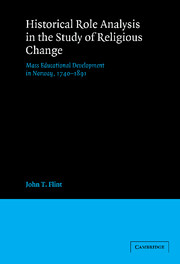 Historical Role Analysis in the Study of Religious Change
Historical Role Analysis in the Study of Religious Change The border between historical sociology and social history has become so permeable in recent years as to be nonexistent for a growing number of practitioners. Nevertheless, it is probably true that most social historians make little if any effort to test or extract explicit propositions of a more general explanatory character. Their emphasis continues to be upon making intelligible a particular sequence of social acts and relationships with reference to some aspects of a specified time period and location. Propositions and generalizations may be more or less implicit in the guise of research questions which define and guide selective criteria in terms of which a monograph is prepared. Among many historical sociologists, more or less explicit conceptual schemes adapted from earlier research on a similar range of social phenomena are often utilized as central elements defining the major variables of testable propositions which may be confirmed, rejected, or modified by the new case material.
The ambivalence I experienced in trying to decide upon a reasonably accurate title for this book may serve to illustrate the ambiguities of these rather blurred distinctions. My first but not ultimate choice, “Mass educational development and popular religious change in preindustrial Norway, 1740–1891,” provided a straightforward indication of time, place, and social historical topic. My primary concerns, however, are more general in a substantive and methodological sense. Thus, my final title became as it now reads, “Historical role analysis in the study of religious change”, sub-title, “Mass educational development in Norway, 1740–1891.”
To save this book to your Kindle, first ensure no-reply@cambridge.org is added to your Approved Personal Document E-mail List under your Personal Document Settings on the Manage Your Content and Devices page of your Amazon account. Then enter the ‘name’ part of your Kindle email address below. Find out more about saving to your Kindle.
Note you can select to save to either the @free.kindle.com or @kindle.com variations. ‘@free.kindle.com’ emails are free but can only be saved to your device when it is connected to wi-fi. ‘@kindle.com’ emails can be delivered even when you are not connected to wi-fi, but note that service fees apply.
Find out more about the Kindle Personal Document Service.
To save content items to your account, please confirm that you agree to abide by our usage policies. If this is the first time you use this feature, you will be asked to authorise Cambridge Core to connect with your account. Find out more about saving content to Dropbox.
To save content items to your account, please confirm that you agree to abide by our usage policies. If this is the first time you use this feature, you will be asked to authorise Cambridge Core to connect with your account. Find out more about saving content to Google Drive.